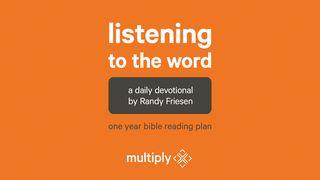Plan info
For The Love Of GodSample

JOB 10 IS THE SECOND PART OF JOB’S response to Bildad the Shuhite. Bildad has argued that God cannot pervert justice (Job 8; see meditation for February 9). In chapter 9 Job replies, rather impatiently, that he knows all that: “Indeed, I know that this is true” (Job 9:2). Job does not doubt that he too, like other mortals, cannot stand up beside the matchless righteousness of God: “But how can a mortal be righteous before God?” (Job 9:2). So Job argues that that is precisely the problem: in this particular case, Job insists he is blameless (Job 9:21), free from any evil that should have attracted the miseries inflicted upon him, but God remains unanswerable. Job is certainly not more evil than many contemporaries who are unscathed by the passing years. But how can a mere mortal plead his case before the Almighty? “He is not a man like me that I might answer him, that we might confront each other in court” (Job 9:32). There is not even available a suitable arbitrator (Job 9:33). As for Job’s “friends,” they increase his suffering, for they will not admit that he is innocent (Job 9:28); they are more than eager to drop him into the nearest slime pit to prove that he is dirty (Job 9:30-31).
Job now turns to address God (chap. 10). He wants to know what charges God has against him (Job 10:2). Full of self-acknowledged bitterness (10:1), Job asks, “Does it please you to oppress me, to spurn the work of your hands, while you smile on the schemes of the wicked?” (Job 10:3). Certainly Job is prepared to acknowledge that God shaped him in the womb, carefully nurtured him, gave him life, and providentially watched over him (Job 10:8-12). But now, it seems, there is another side: God will not only hunt him down if he sins, but even if Job is innocent he finds he cannot answer this God or compete against the pressures God is able to bring to bear (Job 10:13-17). So why did God bring him to life in the first place? Or why did Job not die as soon as he was born, carried from the womb to the grave (Job 10:18-22)?
This is the rhetoric of anguish and despair. We still await God’s answer. But Romans 14 may have something to say to Job’s miserable “friends”: “Let us therefore make every effort to do what leads to peace and to mutual edification” (Rom. 14:19). Of course, in the context of Romans 14, Paul is focusing on Christian self-restraint for the sake of others, especially in the matter of eating food offered to idols (as in 1 Cor. 8; see vol. 1, meditation for September 3). Yet the broad principle applies nonetheless to Job’s friends: do they speak out of passionate commitment to “mutual edification” or out of frightened self-justification?
Scripture
About this Plan

A daily devotional for discovering the riches of God's word: For the Love of God is a daily devotional designed to walk a person through the Bible in a year while assisting the reader in discovering the riches of God's W...
More
We would like to thank The Gospel Coalition for providing this plan. For more information, please visit: thegospelcoalition.org









